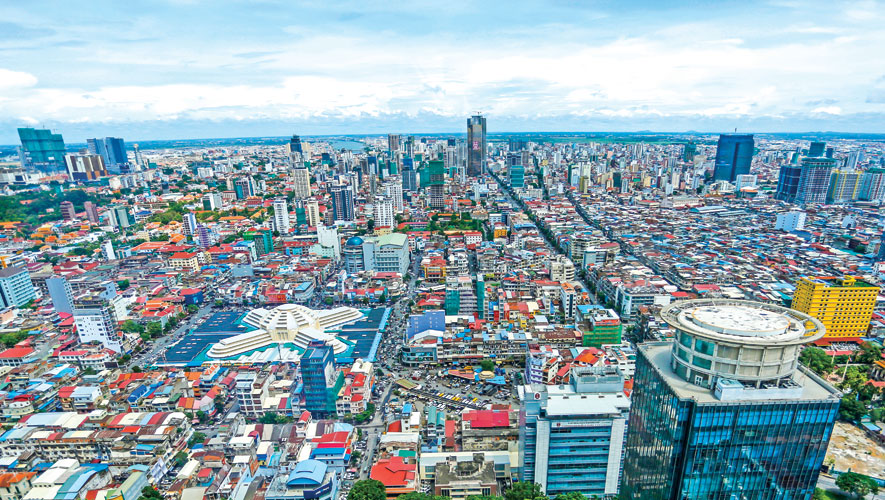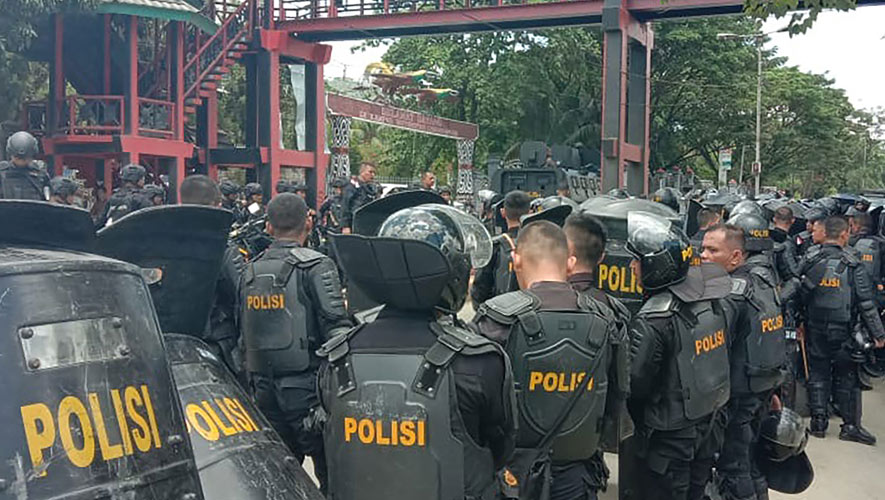Climate-change protests led by 16-year-old Greta Thunberg throughout the year managed to jolt governments and conglomerates around the globe awaken and to steer their countries onto a more sustainable path.
For the latest Cambodian Business news, visit Khmer Times Business
Changing weather patterns and rising sea levels have disrupted economies and affected the lives of many, mostly the poor and most vulnerable in societies.
However, with affordable and scalable solutions present as options, countries are able to develop their economies into becoming more resilient.
In Cambodia, green initiatives have made their way into the Royal Government’s Rectangular Strategy and, along with foreign bodies and nongovernmental organisatins pushing forward the green agenda, further encouraging both the public and private sectors to adopt sustainable efforts.
“Sustainability should be viewed as an opportunity rather than a burden,” says Phan Phalla, undersecretary of state at the Ministry of Economy and Finance, adding that the government has prioritised green initiatives.
Phalla who was speaking at the recent Eurocham Green Business Forum 2019 in Sofitel Phnom Penh Phokeethra, urged for developers and entrepreneurs to apply innovative models and strategic partnerships in their projects.
The forum saw an active discussion between private and public sector representatives stressing more actions on issues ranging from sustainable growth to eco-friendly developments in the Kingdom.
Green investments
According to a report by Bloomberg media agency, at least $30.7 trillion of funds in five regions from the US to Australia is held in sustainable or green investments, recording an increase of 34 percent from 2016.
Cambodia, despite being one of the least banked markets in Asia, has an economy that has experienced rapid growth. One of the landmark policies in recent years has been the Cambodian Sustainable Finance initiative that was kicked off by the Association of Banks in Cambodia (ABC) and the International Finance Corporation (IFC) in June 2018.
This makes the Kingdom one of the 22 countries among 38 developing countries that have adopted national sustainable finance policies and voluntary policies.
ABC had also recently signed a memorandum of understanding (MoU) with the Ministry of Environment (MOE), the National Bank of Cambodia and the United States Agency for International Development (USAID) to strengthen cooperation in sustainable financing.
Aiming to eliminate financing that leads to environmental impacts such as deforestation or air pollution, the collaboration between the various authorities will see each party play a vital role. ABC Chairman, In Channy stated during the signing that businesses will not be granted loans that could possibly have a negative impact on the environment.
The MOE on the other hand will relay information in regards to business activities that are flagged as risks to the environment to USAID, which will compile it into a system.
The agreement was seen as a renewed commitment from the agreed cooperation in 2016 where the ABC, MOE and NBC had come together to publicly commit themselves to the development of sustainable finance principles to guide the Cambodian banking sector toward greater sustainability and create safeguards that manage and mitigate negative social as well as environmental impacts attributed to banking practices.
USAID’s Green Invest Asia, US’ flagship climate finance initiative focused on sustainable land use in Southeast Asia, seeks to support companies’ readiness to secure finance for the sustainable production of cashews, charcoal (made from coconut waste and recycled wood) and teak.
Projects contributing to environment protection will also receive financing as a result of the collaboration between the MOE and ABC.
Co-founder and Managing Director of BEE Green Building Consulting Susanne Bodach believes the initiatives taken to push forth sustainable financing are commendable however, when it comes to financing, the framework must be well defined and the market must be ready.
Referring to the NBC’s recent encouragement for banks to issue green bonds, Bodach says green bonds works best in more mature market situations.
“Here in Cambodia, it will only work if development banks and organisations are involved, which is the case with Swiss-based Bank for International Settlements (BIS) and USAID,” says Bodach.
Khim Sok, Program Manager of Natural Resource Governance, Oxfam tells Capital Cambodia that environment, social and governance based finance is not just essential for governments to achieve their Sustainable Development Goals (SDG), it also makes smart business sense for financial institutions.
“In Cambodia, commercial banks play a crucial role in allocating financial resources, and thus a large majority of the top foreign and Cambodian companies are dependent on the financial services of these banks,” Sok says.
“A landmark global study of more than 2,300 companies in 2015 found that companies that perform well on material sustainability issues outperformed the total dataset by 4.83 percent annually, while firms with low performances on material and non-material sustainability issues destroyed value by 2.2 percent annually,” he added.
Sok goes on to say that the narrative of sustainable financing in Asia and in Cambodia is still weak and needs to be strengthened.
“There is also a critical need to strengthen the abilities of Cambodian banks in implementing responsible financing policies and to ensure that green washing is not being done by these banks,” he stresses.
Bodach, sharing a similar view to Sok, points out that the biggest challenge is to make it work and have projects to finance. She says that banks must have a good understanding of what a green investment project looks like.

BEE Green Building Consulting
ESIAs and green certificates
“We also need a shift in mindset towards more consideration of sustainability in the construction sector. Cambodia has experienced a strong economic development. It is now time to ensure a sustainable low-carbon development path for the country,” Bodach says.
Established in 2015, the National Council for Sustainable Development (NCSD) has made efforts to improve coordination of climate change activities in Cambodia in order to promote a stronger, comprehensive and effective climate response, including the preparation of the Cambodian Climate Change Strategic Plan 2014-2023, the Sectoral Climate Change Action Plans and the Climate Change Financing Framework.
“The government, in particular, the NCSD has recently started a project on green building certification. The idea is to develop a National Green Building Guideline and Certification System like LOTUS in Vietnam or Green Mark in Singapore,” Bodach says.
She points out that while the initiatives are in the early stages, the government could push more by giving incentives such as tax incentives, height bonuses and expedited permitting to building developers or investors who go green and certify their project
Bodach points out that there is a generally weak regulatory framework for the construction sector and, in particular, when it comes to green building issues.
“Green building certification can fill this gap partly and provide guidance to developers on how to make these projects more sustainable,” she says.
Another addition to the growing number of green initiatives in the country is the Environmental and Social Impacts Assessments (ESIA) Study. Commonly known as Environmental Impact Assessment (EIA) globally, the assessment identifies any potentially adverse environmental consequences of a proposed development project in order to avoid them and to take them into account during planning and design.
Working together with the MOE, Sustinat Green Co Ltd, a company that specialises in ESIA, says if there is more than 70 percent concern on a proposed development project, the government can consider rejecting the project.
A representative from Sustinat Green highlighted that the MoE has made substantive reform within the environment and natural resource sectors towards achieving strategic goals of environment protection and sustainable development in the country.
“From a technical point of view, ESIA study is getting better compared with our first that took place in 2015,”says the representative, pointing out the lack of specific guidelines in the initial days as the company faced with uncertainty in defining the scope of study and inconsistent reviews on their reports.
The uncertainties had affected their scope of studies and timeframe, resulting in delays in the process of investment projects.
“Last year, the MOE issued a prakas (directive) to officially implement specific guidelines for preparing ESIA reports for industries such as the oil and gas and extractive mining industry,” Sustinat Green’s representative highlighted.
However, implementing ESIAs can prove to be struggle with the presence of challenges at every stage. The studies are often conducted at a later stage of the development project, attributing to insufficient project information and supported documents such as a detailed master plan and waste water treatment facility are crucial to the study.
“There is also a conflict between regulations and scientific research,” says Sustinat Green’s representative pointing out that because of a limited timeframe from the Ministry of Environment, an initial ESIA study is required to complete the study within three months and six months for a full ESIA study.
Scientifically, it is required to conduct a survey on fauna and flora in both dry and wet seasons on a proposed development project which has potential effects on wildlife, therefore baseline surveys might not represent both seasons.
The coming years
Kim Sok of Oxfam believes there will be an exponential growth in terms of sustainable financing as many banks are waking up to the fact there is an urgent need to ensure responsible financing policies and implementation of those policies in order for countries to develop in an economically viable and sustainable manner.
“ESG based investments are growing worldwide and though it is a little slow in the region in comparison with other countries in the world, it is critical that sustainable banking is ensured,” Sok says.
As both the public and private sector come together in collaborating to push forth green financing along with other green initiatives in the country, Cambodia is slowing rising among the ranks in ensuring the country plays an important role in forming a sustainable future.




